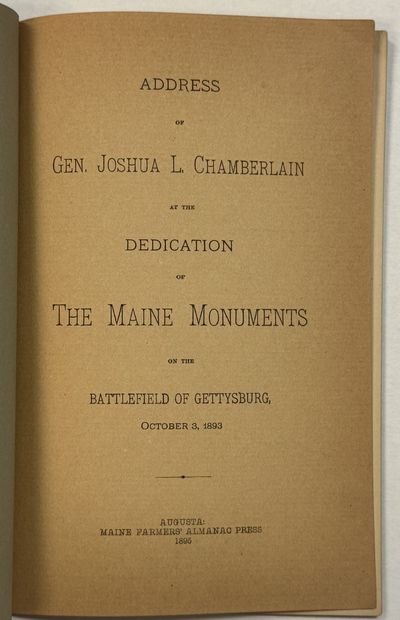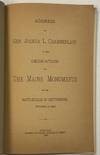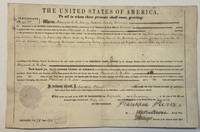1895 · Augusta
by Chamberlain, Joshua L.
Augusta: Maine Farmers' Almanac Press, 1895. Original printed wrappers, stitched. 15, [1 blank] pp.Title page lightly toned, Near Fine.
Chamberlain's gallantry at Little Round Top saved the day for the Union at Gettysburg, and gained him a Congressional Medal of Honor, awarded to him in 1893. Chamberlain delivered identical remarks on 3 October 1889 at the dedication of the Monument to the 20th Maine. We have not located any historical evidence that he was present at Gettysburg on 3 October 1893, or that he delivered his Address in 1893. Why publication was delayed until 1895 is also unclear, but perhaps has something to do with the fact that the Gettysburg National Military Park was established that year. Perhaps a Chamberlain scholar can untie these knots.
"In 1889, one of the most noted veterans of the battle of Gettysburg, Joshua Lawrence Chamberlain, the former colonel of the 20th Maine Infantry, returned to the wooded slopes of Little Round Top to speak at the dedication of a monument to his former command. The simple stone monument marked the spot where his New Englanders had fought twenty-six years earlier on July 2, 1863. Chamberlain’s remarks that day have become some of the most quoted of any speech given by a veteran of the battle." [online blog of Gettysburg National Park.]
His Address articulates an abstract, mystical ideal of Unity that purportedly animated northern troops. "Our thoughts were not then of States as States, but of the States united, - of that union and oneness in which the People of the United States lived and moved and had their being. . . In great deeds something abides. On great fields something stays. Forms change and pass; bodies disappear, but spirits linger, to consecrate ground for the vision- place of souls. And reverent men and women from afar, and generations that know us not and that we know not of, heart-drawn to see where and by whom great things were
suffered and done for them, shall come to this deathless field to ponder and dream; And lo! the shadow of a mighty presence shall wrap them in its bosom, and the power of the vision pass into their souls."
For Chamberlain, "The memory of the war—and remembering it—became an obsession. He regularly spoke and wrote about it for the rest of his life, even when busily serving as Governor of Maine or president of Bowdoin College. He argued about it with former comrades and foes alike. Chamberlain fiercely protected his own legend as the battle of Gettysburg’s 'savior of Little Round Top.' In short, being a war hero became the key to Joshua Chamberlain’s identity for the nearly fifty years he lived after the conflict ended" [online emergingcivilwar blog article on Chamberlain by Arrington].
OCLC 4863675 [7 locations as of June 2025]. Not in Nevins or LCP. Not in Williamson's Bibliography of Maine, which was published in 1896. Not at AAS's online site. (Inventory #: 41047)
Chamberlain's gallantry at Little Round Top saved the day for the Union at Gettysburg, and gained him a Congressional Medal of Honor, awarded to him in 1893. Chamberlain delivered identical remarks on 3 October 1889 at the dedication of the Monument to the 20th Maine. We have not located any historical evidence that he was present at Gettysburg on 3 October 1893, or that he delivered his Address in 1893. Why publication was delayed until 1895 is also unclear, but perhaps has something to do with the fact that the Gettysburg National Military Park was established that year. Perhaps a Chamberlain scholar can untie these knots.
"In 1889, one of the most noted veterans of the battle of Gettysburg, Joshua Lawrence Chamberlain, the former colonel of the 20th Maine Infantry, returned to the wooded slopes of Little Round Top to speak at the dedication of a monument to his former command. The simple stone monument marked the spot where his New Englanders had fought twenty-six years earlier on July 2, 1863. Chamberlain’s remarks that day have become some of the most quoted of any speech given by a veteran of the battle." [online blog of Gettysburg National Park.]
His Address articulates an abstract, mystical ideal of Unity that purportedly animated northern troops. "Our thoughts were not then of States as States, but of the States united, - of that union and oneness in which the People of the United States lived and moved and had their being. . . In great deeds something abides. On great fields something stays. Forms change and pass; bodies disappear, but spirits linger, to consecrate ground for the vision- place of souls. And reverent men and women from afar, and generations that know us not and that we know not of, heart-drawn to see where and by whom great things were
suffered and done for them, shall come to this deathless field to ponder and dream; And lo! the shadow of a mighty presence shall wrap them in its bosom, and the power of the vision pass into their souls."
For Chamberlain, "The memory of the war—and remembering it—became an obsession. He regularly spoke and wrote about it for the rest of his life, even when busily serving as Governor of Maine or president of Bowdoin College. He argued about it with former comrades and foes alike. Chamberlain fiercely protected his own legend as the battle of Gettysburg’s 'savior of Little Round Top.' In short, being a war hero became the key to Joshua Chamberlain’s identity for the nearly fifty years he lived after the conflict ended" [online emergingcivilwar blog article on Chamberlain by Arrington].
OCLC 4863675 [7 locations as of June 2025]. Not in Nevins or LCP. Not in Williamson's Bibliography of Maine, which was published in 1896. Not at AAS's online site. (Inventory #: 41047)



![MANUSCRIPT COURT DOCUMENT: IN THE MATTER OF LANDS OF CALEB WILLIAMS SOLD TO COL. JAMES SINKLER. 1. THE RENUNCIATION OF DOWER OF MRS. FOXWORTH, WIFE OF JOSEPH FOXWORTH IS IMPROPERLY TAKEN ON THE DEED FROM JOSEPH FOXWORTH TO CALEB WILLIAMS, MUST BE TAKEN ANEW. 2. THERE IS A JUDGMENT IN THE COMMON PLEAS AGAINST C.A. WILLIAMS ADV THE SO. CAROLINA RAIL ROAD COMPANY - 16 JUNE 1849 FOR $23.35. PERONNEAU'S & HAYNE DEFTS ATTY WHICH MUST BE SATISFIED 3. THERE IS A JUDGMENT AGAINST CALEB WILLIAMS SAME COURT, SAME DATE, FOR $337.02 PETIGRU & LESESNE PLTFFS ATTY, WHICH MUST BE SATISFIED 4. MORTGAGES BY JOSEPH FOXWORTH TO CALEB WILLIAMS 1843 OPEN ON RECORD TO BE SATISFIED. / [signed] JAMES SIMONS FOR COL. JAMES SINKLER. 5 MAY 1852](https://d3525k1ryd2155.cloudfront.net/h/558/684/1693684558.0.m.jpg)
